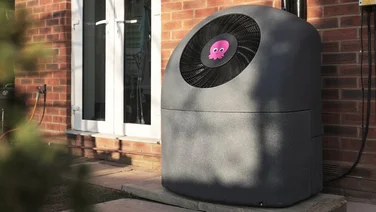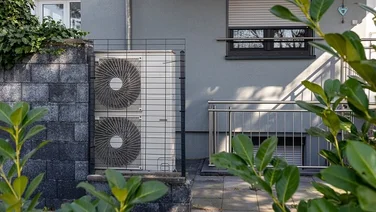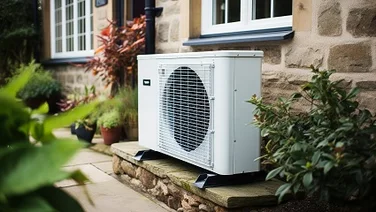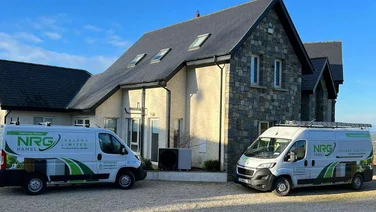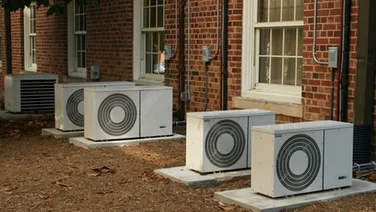✔ Heat pumps are at least three times more efficient than gas boilers
✔ The best heat pumps are five times more efficient
✔ They achieve that level of efficiency without polluting the planet
The future is bright for air source heat pumps – their efficiency is miles ahead of gas boilers, they’re purely powered by electricity, and heat pump costs are also coming down thanks to the government’s Boiler Upgrade Scheme.
We’ve delved into exactly how much more efficient air source heat pumps are than other heating systems, and what makes them so much better.
Want to get tailored quotes straight from the horse’s mouth (otherwise known as our expert suppliers)? Pop your details into this short form, and our trusted installers will be in touch with quotes for you to compare – and you can let the best deals come to you.

What type of central heating do you currently use?
Get startedHow efficient are heat pumps?
Type of heat pump/boiler | Ground source heat pump | Air source heat pump | Water source heat pump | High temperature heat pump | Electric boiler | Gas boiler | Oil boiler |
|---|---|---|---|---|---|---|---|
Average efficiency | 350% | 300% | 450% | 300% | 100% | 95% | 92% |
Heat pumps typically have an efficiency rate of 300%, though the best ones can reach much higher rates.
This means that on average, your heat pump will produce an outstanding three units of energy for every unit of electricity it absorbs.
To put this in context, the average UK home uses just over 12,000 kWh per year for heating, and your heat pump would be able to provide the same amount of heat from just 4,000 kWh.
In comparison, electric boilers are three times worse – with an efficiency rate of 100% – while the best gas boilers can only reach 98% efficiency, at most.
Electricity is usually four times more expensive than gas, which negates any gains you’d make from your heat pump’s incredible efficiency – but the times are changing.
With electricity fast becoming the best way for the UK to reach its goal of net-zero emissions by 2050, you’d be investing in a future that’s almost here – and which will save you an enormous amount on your heating bill when it does arrive.
Despite this advantage, our National Home Energy Survey found that only 25% of people would have a heat pump if it were free.
Why are heat pumps so efficient?
Heat pumps are three times more efficient than gas and electric boilers because they can use the natural warmth in the air, the earth, or water to supplement the process.
Most of the energy is supplied by the warmth contained in this natural source of energy, with a relatively small amount of electricity powering the rest of the process.
A compressor and heat exchange use that electricity to heat up this warmth to the level needed to supply a domestic heating system.
You can work out how efficient any given model is by looking at its Coefficient of Performance (CoP) – though you should check the Seasonal Performance Factor (SPF) for a full picture.
While the CoP tells you a machine’s peak efficiency, the SPF tells you the heat pump’s average efficiency over the course of an entire year.
If you want to take advantage of heat pumps’ incredible efficiency rates – and eco-friendly credentials – just fill in this free form, and our professional installers will be in touch with quotes.
Why are ground source heat pumps more efficient than air source?
Ground source heat pumps are more efficient because they draw practically the exact same amount of warmth from the ground all year round, where as air source heat pump output drops in winter.
This puts these ground source machines, which draw warmth from at least a metre below the Earth’s surface, a step above air source heat pumps.
Some models are more efficient than their air-based cousins, while others fall short – it’s all down to the individual heat pump, and its capabilities.
Want to get a better idea of what it’s like to own an air source heat pump? Check out our case study with Louise, from South London.
Louise had a 12-kilowatt air source heat pump installed to reduce her reliance on fossil fuels, and received £5,000 off the upfront cost through the Boiler Upgrade Scheme. Now, Louise can enjoy a warm, even temperature throughout the house, without fluctuations.
Take a look at the full interview with Louise to learn more.

How efficient are air source heat pumps in winter?
Air source heat pumps are around 20% less efficient during winter, because they need more electricity to draw the heat from the air.
This means that, despite some myths claiming they’re not as efficient as boilers during the winter, they’re still around 2.5 times more efficient than gas boilers – even when it’s snowing outside.
And you don’t need to worry about your air source heat pump breaking down at any point, even if the temperature falls below freezing.
Modern heat pumps continue working when it’s as cold as -10°C, and the best models will still keep you warm even when it’s -25°C outside.
That’s because there’s still heat in the air at this point. For there to be no heat at all, it would have to be -273°C – and even the worst British winters don’t get quite that bad.
During the winter, you might need to carry out maintenance checks more regularly, since the weather typically gets worse during these months.
In areas with extreme weather during the cold months, homeowners could consider getting a heat pump cover, which guards the outside unit against debris and snow.
What type of central heating do you currently use?
Get startedWhat’s the most efficient heat pump?
The most efficient heat pump is the Hitachi Yutaki M RASM-4VNE, according to our ranking of the best heat pumps of the year.
This wonderful air source heat pump has an efficiency of 500%, meaning it produces five units of heat for every unit of electricity.
Hitachi’s market-beating model produces 11 kW of heat, which is more than good enough for the average house, and will even provide enough heat for a 200 m² home.
And if your supplier uses the government’s Boiler Upgrade Scheme, you can get it with a £7,500 discount.
It’s possible that your property might not be suitable for a traditional heat pump. If that’s the case, it might be beneficial to look into zero-emission boilers as an alternative.
Next steps
If you like the sound of what you’ve read so far, your next move is to do some research to see which model would suit your home.
Look through our best air source heat pumps to check whether any of the top machines would work for you – and when you get your new heat pump installed, make sure your chosen company uses the Boiler Upgrade Scheme to get you a discount of £7,500.
Make sure you use our air source heat pump cost calculator to get an estimate.
Then, if you want to get the best deal around, simply pop your details into our comparison tool and let us take the reins. We’ll pass on your details to our professional heat pump installers, who will then get in touch with their best prices.
Heat pump efficiency: FAQs
Are heat pumps really 300% efficient?
Heat pumps are at least 300% efficient on average, meaning they generate three units of heat for every unit of electricity they use.
This is made possible by heat pumps’ use of warmth from other, natural sources of energy, such as the air, the ground, and bodies of water.
Heat pumps use the energy produced by these renewable sources, in addition to electricity, to generate heat at 300% efficiency.
Why are heat pumps not popular in the UK?
Heat pumps aren’t popular in the UK because of the cost, the lack of cultural acceptance, the government’s negligence over ensuring there are enough heat pump engineers, and the country’s poorly insulated houses.
Successive governments have failed to promote heat pumps to the public, insulate homes so heat pumps are as effective as they are in other European countries, subsidise the upfront cost so it’s widely accessible, and invest in training more installers.
Until a government takes these actions, the UK will stay second-bottom of the European heat pump race.
What is the major disadvantage of a heat pump system?
The major disadvantage of a heat pump system is that it’s only truly effective in a properly insulated home with suitable radiators.
Heat pumps release warmth at a lower temperature than most boilers, meaning it takes longer to warm up a home – which is fine as long as the great majority of that warmth remains in your home during the process.
For that to be the case, a property needs to be well-insulated.

